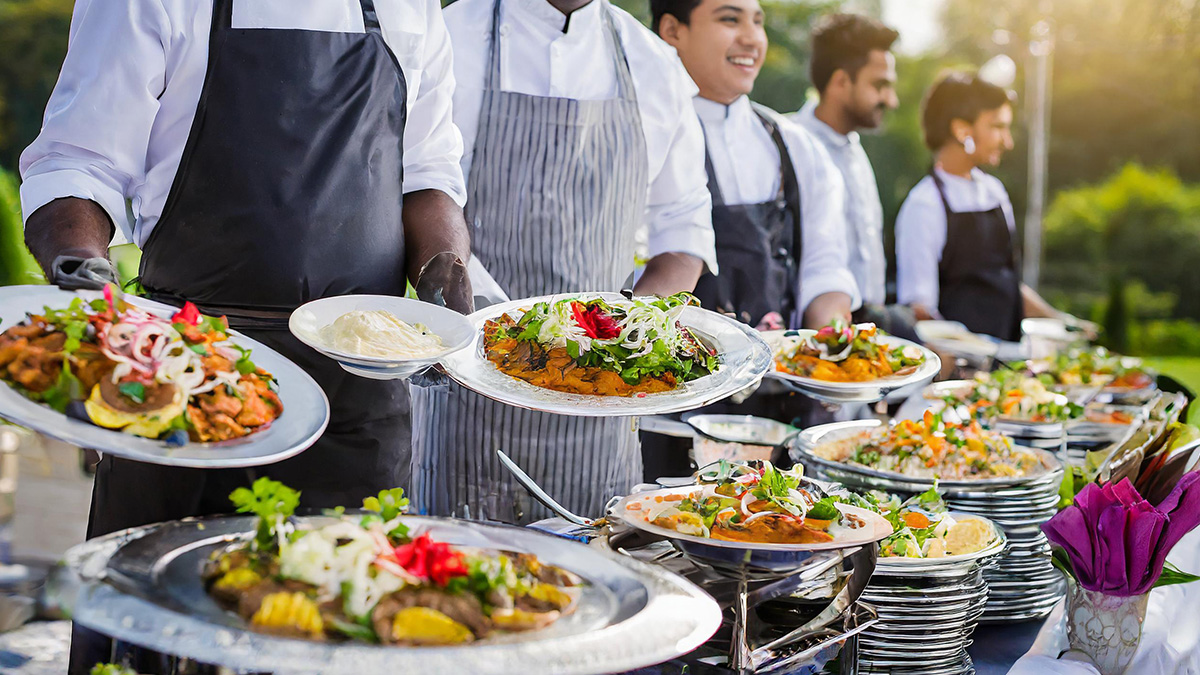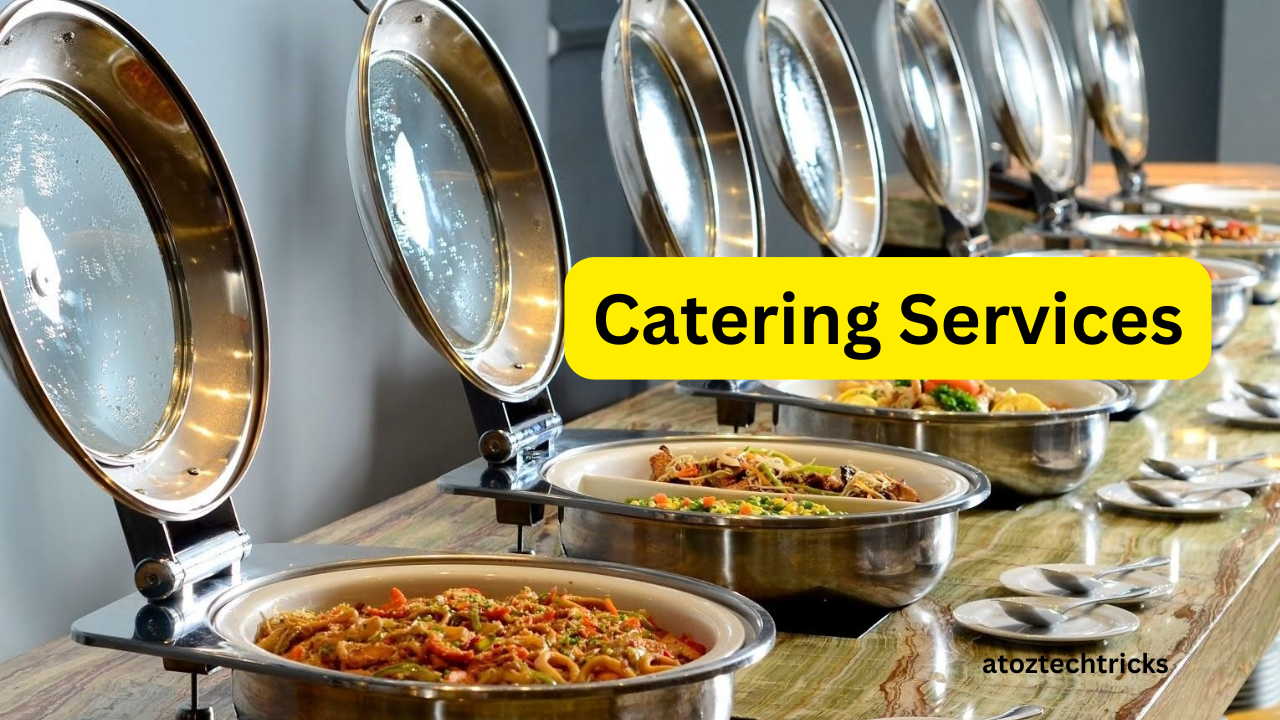The Ultimate Guide to Catering Services: Everything You Need to Know
Catering services are a cornerstone of hospitality, providing food and beverage solutions for events ranging from intimate gatherings to grand celebrations. Whether you’re planning a wedding, corporate event, or private party, understanding how catering services operate and the various options available can significantly impact the success of your event. This guide will delve into the different types of catering services, the factors to consider when choosing a caterer, and the latest trends in the industry.
Understanding Catering Services
Catering is the business of providing food and beverage services for various events. It involves everything from menu planning and food preparation to serving and cleanup. Catering can be provided for a wide range of events, including:
- Weddings
- Corporate events
- Private parties
- Festivals
- Conferences
- Product launches
- Charity events
Catering services can vary widely in scope, with some companies offering full-service catering that includes event planning, décor, and staffing, while others may focus solely on food and beverage provision.
Types of Catering Services
There are several types of catering services, each suited to different kinds of events and client needs. Understanding the distinctions between these can help you choose the right catering service for your event.
1. Wedding Catering
Weddings are one of the most common events that require catering services. Wedding catering is often the most elaborate, as it includes not just food and beverage services but also table settings, décor, and sometimes even event coordination. Wedding caterers typically offer various menu options, including plated dinners, buffets, and cocktail receptions. They also provide options for different courses, such as appetizers, main courses, and desserts.
Key Considerations for Wedding Catering:
- Menu customization: Tailoring the menu to the couple’s preferences.
- Dietary restrictions: Accommodating guests with allergies or specific diets.
- Venue coordination: Ensuring the catering service aligns with the venue’s facilities.
- Tasting sessions: Offering the couple a chance to sample dishes before the event.

2. Corporate Catering
Corporate catering is tailored for business events, including conferences, meetings, and product launches. This type of catering often emphasizes efficiency and professionalism. The food and beverages are typically simple but high-quality, focusing on providing sustenance without distracting from the business agenda.
Key Considerations for Corporate Catering:
- Time management: Ensuring meals are served promptly to keep the event on schedule.
- Menu selection: Offering a range of options that appeal to diverse palates.
- Service style: Buffet, boxed lunches, or plated meals, depending on the event format.
- Brand alignment: Catering that reflects the company’s brand image.
3. Social Event Catering
Social event catering covers a wide range of events, including birthdays, anniversaries, graduations, and more. These events are often less formal than weddings but still require careful planning to ensure guests are satisfied.
Key Considerations for Social Event Catering:
- Theme alignment: Ensuring the menu and presentation match the event’s theme.
- Guest engagement: Interactive food stations or live cooking demonstrations.
- Variety: Offering a diverse selection of dishes to cater to different tastes.
- Flexibility: Adapting to the casual or formal nature of the event.
4. Concession Catering
Concession catering is typically provided at large-scale events such as festivals, fairs, or sports events. This type of catering focuses on quick, convenient food options that can be easily consumed on the go. Concession caterers often operate food stands or trucks and serve items like hot dogs, burgers, nachos, and drinks.
Key Considerations for Concession Catering:
- High-volume service: Ability to serve large crowds quickly.
- Menu simplicity: Offering popular, easy-to-prepare items.
- Portability: Food that can be easily carried and consumed.
- Pricing: Affordable options for a wide audience.
5. Private Chef Catering
Private chef catering involves hiring a chef to prepare a meal specifically for a small group, often in a private home. This type of catering is highly personalized and can be ideal for intimate gatherings, such as dinner parties or small celebrations.
Key Considerations for Private Chef Catering:
- Personalization: Tailoring the menu to the client’s specific tastes.
- Interaction: The chef often interacts directly with guests, explaining dishes and cooking methods.
- Exclusivity: A unique, high-end dining experience.
- Service style: Typically includes multiple courses, served individually.
Factors to Consider When Choosing a Catering Service
Choosing the right catering service is crucial to the success of your event. Here are some essential factors to consider:
1. Budget
Your budget will significantly influence the type of catering service you can afford. Catering costs can vary widely depending on the menu, service style, and number of guests. It’s important to have a clear understanding of your budget from the outset and communicate it to potential caterers.
Tips for Budgeting:
- Get multiple quotes: Comparing prices from different caterers can help you find the best deal.
- Consider all costs: Don’t forget to include costs for service staff, rentals, and gratuities.
- Prioritize: Focus on what’s most important to you, whether it’s the quality of the food, presentation, or service.
2. Menu Options
The menu is one of the most critical aspects of any catering service. It’s essential to choose a caterer who can offer a menu that suits your event’s style and your guests’ preferences.
Questions to Ask About the Menu:
- Can the menu be customized? Ensure the caterer is willing to tailor the menu to your needs.
- Are there options for dietary restrictions? Consider any allergies or dietary preferences among your guests.
- Is the food fresh and locally sourced? Quality ingredients can make a significant difference in taste.
3. Service Style
The service style you choose will impact the overall feel of your event. Common service styles include:
- Plated service: Guests are served individually at their tables.
- Buffet: Guests serve themselves from a selection of dishes.
- Family style: Large dishes are placed on the table for guests to share.
- Cocktail reception: Small, bite-sized appetizers are served while guests mingle.
Each service style has its advantages and disadvantages, depending on the type of event and the guest experience you want to create.
4. Experience and Reputation
A caterer’s experience and reputation are critical indicators of their ability to deliver a successful event. Researching a caterer’s background, reading reviews, and asking for references can help you gauge their reliability.
Tips for Assessing Experience:
- Check references: Ask the caterer for references from past clients.
- Read reviews: Look for online reviews on platforms like Yelp, Google, or WeddingWire.
- Ask about past events: Inquire about the types of events they’ve catered to and their success rate.
5. Tasting Sessions
Many caterers offer tasting sessions, allowing you to sample their dishes before making a final decision. This can be an invaluable opportunity to assess the quality of the food and ensure it meets your expectations.
Tips for Tasting Sessions:
- Take notes: Record your impressions of each dish to help you make a decision later.
- Consider presentation: Evaluate not just the taste but also how the food is presented.
- Bring someone along Having a second opinion can be helpful.
Freelance Business Ideas: A Comprehensive Guide to Starting Your Own Freelance Venture
The Latest Trends in Catering
The catering industry is constantly evolving, with new trends emerging that reflect changes in consumer preferences, dietary habits, and event styles. Here are some of the latest trends in catering:
1. Sustainable Catering
Sustainability is becoming increasingly important in the catering industry. This trend includes sourcing local, organic ingredients, reducing food waste, and using eco-friendly packaging and utensils.
Sustainable Catering Practices:
- Farm-to-table menus: Using ingredients sourced from local farms.
- Minimizing waste: Offering portion sizes that reduce leftovers.
- Eco-friendly products: Use biodegradable or reusable plates, utensils, and napkins.
- Sustainable seafood: Choosing seafood that is responsibly sourced.
2. Interactive Food Stations
Interactive food stations are a popular trend, particularly for social events and weddings. These stations allow guests to customize their meals or watch as food is prepared in front of them, adding an element of entertainment to the dining experience.
Examples of Interactive Stations:
- Build-your-own taco bar: Guests choose their fillings and toppings.
- Sushi rolling station: A sushi chef prepares rolls to order.
- Pasta station: Guests select their pasta, sauce, and toppings.
- Dessert stations: Options like make-your-own sundae bars or crepe stations.

3. Plant-Based Menus
With the rise of vegetarianism and veganism, plant-based menus are becoming increasingly popular. Many caterers now offer fully plant-based menus or have a wide range of vegetarian and vegan options available.
Benefits of Plant-Based Catering:
- Healthier options: Plant-based diets are often lower in calories and fat.
- Environmental impact: Plant-based foods typically have a lower carbon footprint.
- Inclusivity: Catering to guests with dietary restrictions or preferences.
4. Global Flavors
Global flavours and fusion cuisine are making a big impact in the catering world. Incorporating dishes from different cultures can add an exciting twist to your event and offer guests a unique dining experience.
Popular Global Cuisines in Catering:
- Mediterranean: Dishes like hummus, falafel, and grilled vegetables.
- Asian fusion: Combining elements from different Asian cuisines, such as sushi with Korean BBQ.
- Mexican: Tacos, guacamole, and churros.
- Middle Eastern: Shawarma, tabbouleh, and baklava.
5. Health-Conscious Catering
With growing awareness of health and wellness, there is a trend towards offering more health-conscious catering options. This includes menus that focus on whole foods, low-calorie options, and dishes that cater to specific dietary needs, such as gluten-free, dairy-free, or keto diets.
Health-Conscious Catering Ideas:
- Superfood salads: Using ingredients like quinoa, kale, and avocado.
- Low-carb options: Dishes that use cauliflower rice or zucchini noodles instead of traditional carbs.
- Smoothie bars: Offering a variety of fresh fruit and vegetable smoothies.
- Sugar-free desserts: Using natural sweeteners like honey or maple syrup.
Meal Prep and Delivery Services: Revolutionizing the Way We Eat
How to Plan a Successful Catering Event
Planning a catering event involves more than just choosing a menu. Here’s a step-by-step guide to ensure your event is a success:
1. Define the Event Purpose and Goals
Before anything else, clarify the purpose of your event and what you hope to achieve. Whether it’s celebrating a milestone, launching a product, or hosting a social gathering, understanding your goals will guide your catering decisions.
2. Set a Budget
Determine your budget early on, and allocate funds for food, beverages, service staff, rentals, and gratuities. Knowing your budget will help you narrow down your choices and avoid overspending.
3. Choose the Right Venue
The venue can significantly impact your catering options. Consider the kitchen facilities, layout, and whether the venue has any restrictions on outside caterers.
4. Select a Caterer
Research potential caterers, read reviews, and ask for references. Schedule tasting sessions with your top choices to ensure the food meets your expectations. Once you’ve made your decision, book your caterer well in advance.
5. Plan the Menu
Work closely with your caterer to plan a menu that suits the event’s style and your guests’ preferences. Consider factors like seasonality, dietary restrictions, and how the food will be served.
6. Organize Service Details
Decide on the service style (plated, buffet, family-style, etc.) and discuss staffing needs with your caterer. Ensure there’s a clear plan for setup, service, and cleanup.
7. Coordinate with Other Vendors
If your event involves other vendors (such as florists, photographers, or event planners), make sure your caterer coordinates with them to ensure everything runs smoothly.
8. Conduct a Final Walkthrough
A few weeks before the event, conduct a final walkthrough with your caterer and other key vendors. Review the timeline, menu, and service details to ensure everyone is on the same page.
9. Communicate with Guests
If your event involves a seated meal, consider sending out menu options in advance so guests can choose their preferences. This is especially important if you’re offering a choice of entrees.
10. Enjoy Your Event
On the day of the event, trust your caterer to handle the details so you can focus on enjoying the occasion. If you’ve done your planning, everything should run smoothly.

Catering services are an essential component of any successful event. Whether you’re planning a wedding, corporate event, or private party, choosing the right caterer can make all the difference. By understanding the different types of catering services, considering key factors like budget and menu options, and staying up-to-date with industry trends, you can ensure your event is memorable and enjoyable for all involved.




Post Comment